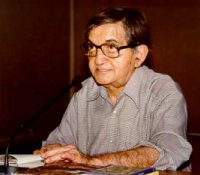Nirmal Verma
| Nirmal Verma | |
|---|---|
 |
|
| Born |
3 April 1929 Shimla, Himachal Pradesh, India |
| Died | 25 October 2005 (aged 76) New Delhi, India |
| Occupation | Novelist, writer, activist, translator |
Nirmal Verma (3 April 1929 – 25 October 2005) was a Hindi writer, novelist, activist and translator. He is credited as being one of the pioneers of the 'Nayi Kahani' (New Story) literary movement of Hindi literature, wherein his first collection of stories, Parinde (Birds) is considered its first signature.
In his career spanning five decades and various forms of literature, like story, travelogue and essays, he penned five novels, eight short-story collections and nine books of non-fiction, including essays and travelogues.
Nirmal Verma was born on 3 April 1929 in Shimla, where his father worked as an officer in the Civil and Serbices Department of the British Indian Government. He was the seventh child among his eight siblings. One of his brothers is one of India's greatest artists Ram Kumar.
He wrote his first story for a students' magazine in the early 1950s. He a completed a Masters of Arts in History from St. Stephen's College, Delhi University. Thereafter he started teaching in Delhi and writing for various literary magazines.
His activism streak was visible even during his student days; in 1947–48, he regularly attended Mahatma Gandhiji's morning prayer meetings in Delhi, even though he was a card holding member of Communist Party of India, which he resigned in 1956, after Soviet invasion of Hungary. The very activism was soon to be reflected in his stories, which added a whole new dimension to the Indian literary scene.
He stayed in Prague for 10 years, where he was invited by Oriental Institute to initiate a program of translation of modern Czech writers like Karel Capek, Milan Kundera, and Bohumil Hrabal, to Hindi; he also learnt the Czech language, and translated nine world classics to Hindi, before returning home in 1968, as the result of Prague Spring.
During his stay in Prague he travelled widely across Europe, and the result was seven travelogues, including Cheeron Par Chandni (1962), Har Barish Mein (1970) and Dhund Se Uthti Dhun and his first novel, based on his student days in Prague, titled, "Ve Din" (Those Days) (1964). On his return from Prague, he was disillusioned by Communism and later became highly vocal against Indian Emergency, and an advocate for the Tibetan independence movement. His subsequent writing reflected his concerted relooking of Indian traditions, which he found to be innately modern, compared with external modernity reflected in the western viewpoints and cultural milieu, which were being imposed on Indian ethos, all around, so much so that later his views were confused as pro-Hindutva as well.
...
Wikipedia
